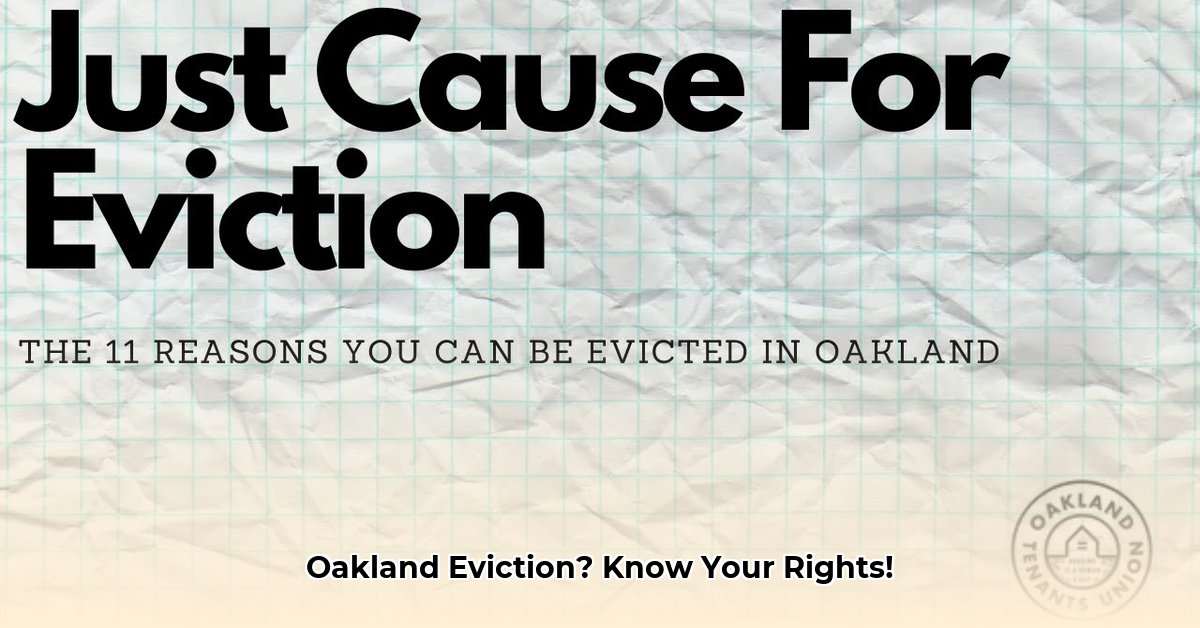
Understanding Oakland's Just Cause Eviction Laws
Facing eviction in Oakland, CA, can be daunting. However, understanding your rights under California's "Just Cause" eviction laws is your first line of defense. These laws significantly protect tenants by requiring landlords to have a valid legal reason—a "just cause"—before initiating eviction proceedings. This guide will equip you with the knowledge and resources to navigate this process effectively. Did you know that over 90% of successful eviction defenses in Oakland involve a clear understanding of these laws? For further information on tenant rights and quiet enjoyment, see this helpful resource.
What Constitutes "Just Cause"?
Oakland's Just Cause ordinance outlines ten legally acceptable reasons for eviction. These are not arbitrary; your landlord must prove their claim in court. Let's clarify each one:
- Nonpayment of Rent: Failure to pay rent according to your lease agreement.
- Violation of Lease Terms: Breaching any stipulations outlined in your lease (e.g., unauthorized pets, subletting).
- Damage to Property: Causing significant damage beyond normal wear and tear. This requires evidence of negligence or intentional damage.
- Illegal Activity: Engaging in illegal activities on the property (e.g., drug manufacturing, illegal business operations).
- Nuisance: Repeatedly disturbing the peace of other tenants (e.g., excessive noise, disruptive behavior).
- Failure to Comply with Health & Safety Codes: Neglecting to address serious health or safety violations on the property.
- Lease Expiration (with Proper Notice): The lease ending, provided the landlord gives legally required notice.
- Owner Move-In: The landlord or immediate family member needing to occupy the unit (strict conditions apply).
- Substantial Rehabilitation or Demolition: Major renovations or demolition requiring tenant relocation.
- End of Tenancy (Units Built Before 1995, Non-RAP): A limited exception for older units not under the Rent Adjustment Program (RAP).
Is your landlord claiming a reason not listed above? They likely lack "just cause."
Exceptions and Nuances: Navigating the Complexities
Several factors can influence the application of "just cause." Understanding these nuances is crucial:
- New Construction (Post-1995): Evictions for substantial rehabilitation or demolition are permitted, but specific procedures and timelines must be followed.
- School-Aged Children: Evicting families with children enrolled in school is restricted during the academic year to avoid disrupting their education.
- Rent Adjustment Program (RAP): Participation in the RAP program grants tenants additional protections and modified eviction procedures. Participating properties are subject to stricter regulations. Verify your building's RAP status with the City of Oakland.
- Defining "Substantial Repairs": Routine maintenance does not justify eviction. The repairs must be extensive, impacting the habitability of the unit, and often require a permit.
- Defining "Disturbance of the Peace": Isolated incidents typically don't qualify. Your landlord must provide evidence of repeated or significant disruptions to other tenants' peaceful enjoyment of their homes.
Procedural Requirements: Protecting Your Rights
Receiving an eviction notice is a serious matter. Here's what you should do:
Step 1: Thoroughly Review the Notice: Is the notice legally valid? Does the stated reason meet the legal definition of "just cause"? Any flaw in the notice could weaken your case.
Step 2: Immediately Contact the Eviction Defense Center (EDC): The EDC offers free legal assistance and representation to Oakland tenants facing eviction. Early contact is critical for effective defense. Their expertise and resources can significantly improve your chances of a successful outcome.
Step 3: Document Everything: Keep records of all communication with your landlord, including emails, letters, and texts. Photograph any property damage or maintenance issues. This documentation is vital evidence.
Step 4: Respond Promptly to the Notice: Failure to respond within the specified timeframe can jeopardize your rights and weaken your defense.
Step 5: Attend All Hearings and Court Dates: Missing court dates will severely harm your case. The participation of a legal expert here is vital.
Step 6: Seek Legal Counsel: While the EDC provides invaluable support, additional legal counsel from a tenant rights attorney may be necessary, particularly in complex cases. Legal representation will be crucial in navigating the complexities of the legal system.
Landlord Responsibilities: Knowing Your Landlord's Obligations
Oakland's Just Cause ordinance places responsibilities on landlords, including:
- Providing proper written notice of eviction, complying with all legal requirements.
- Clearly stating the specific reason for eviction (just cause).
- Adhering to all legal procedures throughout the eviction process. Failure to do so can render the eviction invalid.
Remember, your landlord cannot retaliate against you for exercising your rights under the law.
Frequently Asked Questions (FAQs)
Q: Can my landlord evict me just to sell the building? A: Generally no. Selling the building is usually not considered "just cause" for eviction.
Q: What if my landlord claims I disturbed the peace, but I didn't? A: Gather evidence to counteract their claim. The EDC can give guidance on gathering evidence and building your defense.
Q: Where can I find more information on Oakland tenant rights? A: Consult the City of Oakland's official website 1 and the resources provided by the Eviction Defense Center.
This guide provides general information. Eviction laws are complex. Always seek professional legal advice if facing eviction. Protecting your rights is paramount.